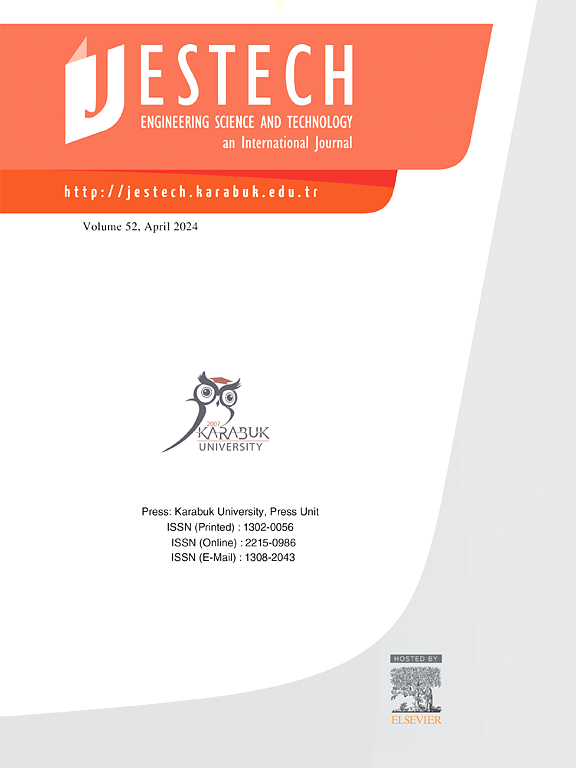Secure electric vehicle charging station demand forecasting under adversarial and false data injection attacks
IF 5.4
2区 工程技术
Q1 ENGINEERING, MULTIDISCIPLINARY
Engineering Science and Technology-An International Journal-Jestech
Pub Date : 2025-10-04
DOI:10.1016/j.jestch.2025.102203
引用次数: 0
Abstract
Forecasting the charging demand of electric vehicle charging stations (EVCSs) is critical for urban planning, resource allocation, policy development, and efficient grid management. However, reliance on sensor-collected data transmitted through various communication channels poses significant cybersecurity risks to forecasting models. This study evaluates the vulnerability of several commonly used forecasting models named random forest (RF), convolutional neural network (CNN), convolutional long short-term memory (ConvLSTM), and bidirectional convolutional long short-term memory (BiConvLSTM), under simulated cyber-attacks. Different attack scenarios, including fast gradient sign method (FGSM) and basic iterative method (BIM)-based adversarial attacks and scaling-based false data injection (FDI) attacks, are considered with varying attack volumes and perturbations. Metrics, such as root mean square error (RMSE), mean absolute error (MAE), and mean absolute percentage error (MAPE), are employed to assess and compare the accuracies of different models. Results indicate that forecasting models exhibit significant performance degradation under these cyber-attacks. As a countermeasure, adversarial training has been employed to mitigate the impact of such attacks and has proven to be highly effective. The experimental observations in this research elucidate the impact of cyber-attacks along with a defense mechanism to mitigate economic and technical risks to the EVCS, fostering the future development of accurate and cyber-resilient forecasting methodologies essential for advancing both academic and industrial domains of EVCS demand forecasting.
对抗性和虚假数据注入攻击下的电动汽车充电站需求预测安全
预测电动汽车充电站的充电需求对城市规划、资源配置、政策制定和有效的电网管理至关重要。然而,对通过各种通信渠道传输的传感器收集数据的依赖给预测模型带来了重大的网络安全风险。本研究评估了几种常用的预测模型随机森林(RF)、卷积神经网络(CNN)、卷积长短期记忆(ConvLSTM)和双向卷积长短期记忆(BiConvLSTM)在模拟网络攻击下的脆弱性。不同的攻击场景,包括基于快速梯度符号法(FGSM)和基于基本迭代法(BIM)的对抗性攻击和基于缩放的虚假数据注入(FDI)攻击,考虑了不同的攻击量和摄动。使用均方根误差(RMSE)、平均绝对误差(MAE)和平均绝对百分比误差(MAPE)等指标来评估和比较不同模型的准确性。结果表明,在这些网络攻击下,预测模型表现出明显的性能下降。作为一种对策,对抗性训练已被用于减轻此类攻击的影响,并已被证明是非常有效的。本研究的实验观察结果阐明了网络攻击的影响以及防御机制,以减轻EVCS的经济和技术风险,促进准确和网络弹性预测方法的未来发展,这对于推进EVCS需求预测的学术和工业领域至关重要。
本文章由计算机程序翻译,如有差异,请以英文原文为准。
求助全文
约1分钟内获得全文
求助全文
来源期刊

Engineering Science and Technology-An International Journal-Jestech
Materials Science-Electronic, Optical and Magnetic Materials
CiteScore
11.20
自引率
3.50%
发文量
153
审稿时长
22 days
期刊介绍:
Engineering Science and Technology, an International Journal (JESTECH) (formerly Technology), a peer-reviewed quarterly engineering journal, publishes both theoretical and experimental high quality papers of permanent interest, not previously published in journals, in the field of engineering and applied science which aims to promote the theory and practice of technology and engineering. In addition to peer-reviewed original research papers, the Editorial Board welcomes original research reports, state-of-the-art reviews and communications in the broadly defined field of engineering science and technology.
The scope of JESTECH includes a wide spectrum of subjects including:
-Electrical/Electronics and Computer Engineering (Biomedical Engineering and Instrumentation; Coding, Cryptography, and Information Protection; Communications, Networks, Mobile Computing and Distributed Systems; Compilers and Operating Systems; Computer Architecture, Parallel Processing, and Dependability; Computer Vision and Robotics; Control Theory; Electromagnetic Waves, Microwave Techniques and Antennas; Embedded Systems; Integrated Circuits, VLSI Design, Testing, and CAD; Microelectromechanical Systems; Microelectronics, and Electronic Devices and Circuits; Power, Energy and Energy Conversion Systems; Signal, Image, and Speech Processing)
-Mechanical and Civil Engineering (Automotive Technologies; Biomechanics; Construction Materials; Design and Manufacturing; Dynamics and Control; Energy Generation, Utilization, Conversion, and Storage; Fluid Mechanics and Hydraulics; Heat and Mass Transfer; Micro-Nano Sciences; Renewable and Sustainable Energy Technologies; Robotics and Mechatronics; Solid Mechanics and Structure; Thermal Sciences)
-Metallurgical and Materials Engineering (Advanced Materials Science; Biomaterials; Ceramic and Inorgnanic Materials; Electronic-Magnetic Materials; Energy and Environment; Materials Characterizastion; Metallurgy; Polymers and Nanocomposites)
 求助内容:
求助内容: 应助结果提醒方式:
应助结果提醒方式:


